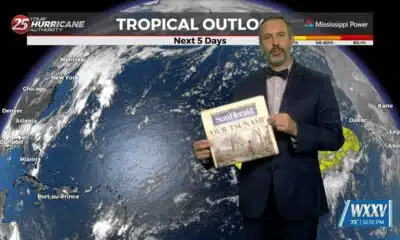News from the South - North Carolina News Feed
Missing voter information the objection of NC search
North Carolina State Board of Elections Executive Director Sam Hayes is setting off on a mission to correct 103,000 North Carolinians’ voting records from which some information is missing.
He maintains that the process, dubbed the Registration Repair Project, will not remove any eligible voters from the state’s voter rolls.
According to the state elections board, 103,270 North Carolina registered voters have records that lack either their driver’s license number, the last four digits of their Social Security number or an indication that they have neither.
[Subscribe for FREE to Carolina Public Press’ alerts and weekend roundup newsletters]
Last year, this missing information became the stuff of headlines, lawsuits and the high-profile election protest of Republican Court of Appeals Judge Jefferson Griffin, who lost his bid for state Supreme Court to the incumbent justice, Democrat Allison Riggs, by 734 votes.
In April, the North Carolina Supreme Court declined to remove ballots from the count based on missing identification numbers; they said the state elections board, not voters, was responsible for a faulty voter registration form that didn’t make it abundantly clear that this information was required.
While Griffin lost, the issue he raised remains salient for a newly Republican elections board and the U.S. Department of Justice, which promptly sued the state board over alleged violations of the federal Help America Vote Act’s voter registration provisions.
Thursday, Hayes told reporters that a process he unveiled in late June to gather these missing identification numbers had begun in earnest.
“We must put this issue behind us so we can focus our attention squarely on preparations for accurate and secure municipal elections this fall,” he said.
The plan to collect missing information
There are two groups of voters under Hayes’ plan.
The first group includes registered voters who have never provided a driver’s license, the last four digits of their Social Security number or an affirmation that they lack both. The state elections board has asked county election boards to check their records for these numbers, in case they were provided but not correctly entered into the voting system.
In early August, the state elections board will send letters to the remaining voters in this group requesting the missing information. If affected voters do not comply, they will vote provisionally in future elections. The elections board will create a flag on these voters’ records for poll workers.
The second group includes registered voters whose records do not show that they’ve provided an identification number, but have shown additional documentation at the polls proving their identity and eligibility under HAVA. These voters may vote a regular ballot.
However, the elections board will still send them a letter in a second mailing asking for the missing identification number to bolster the state’s voter records. Even so, if they do not oblige, they still will not be at risk of being disenfranchised, NCSBE General Counsel Paul Cox said.
County election boards have already made progress, and their work will continue as the mailings go out, Hayes said.
Voters can check to see whether they’re on the list of those with missing information by using the Registration Repair Search Tool. If voters don’t want to wait for the August mailing, they can submit an updated voter registration form using their driver’s license through the online DMV portal or visit their county elections board in person with their driver’s license or Social Security card.
“We anticipate the number of voters on the list will decrease quickly as word spreads about this important effort,” Hayes said.
The State Board of Elections unanimously approved the plan last month, despite some concerns from Democrat Jeff Carmon about putting up an extra obstacle for voters because of a problem with missing information that the voters didn’t cause.
“It’s hard to understand starvation if you’ve never felt the pangs of hunger,” Carmon said. “It’s the same situation with voting obstacles. Your perspective of an obstacle may not be the same as someone who’s consistently had their identity and their validity questioned.”
Nonetheless, Carmon and fellow Democrat board member Siobhan Millen ultimately voted in support of the plan.
Same ballot, different rules
Normally, when a voter casts a provisional ballot, the county elections board determines whether their ballot counts by the post-election canvass, held nine days after an election.
Voters may have to provide documentation or information to prove their eligibility to vote in order to be accepted.
The same process applies to the 103,000 affected voters, with a catch. Their vote may be accepted for federal contests, but not state contests, due to a difference in law.

According to the DOJ’s interpretation, the National Voter Registration Act requires all provisional votes of “duly registered voters” to count, Cox said.
But the state elections board has interpreted the state Supreme Court and North Carolina Court of Appeals’ decisions in the Griffin case as requiring a driver’s license, the last four digits of a Social Security number or an affirmation that a voter has neither before accepting their votes in state and local contests.
Under a recent election law change, county election boards have three days to validate and count or reject provisional ballots.
But sometimes, mismatches happen during validation due to database trouble with reading hyphenated names or connecting maiden and married names, for example, Cox said. The board has designed a “fail safe” in case this comes up.
When there’s a mismatch during the validation process, state law allows voters to provide additional documentation — like a driver’s license, bank statement or government document with a voter’s name and address — to prove their eligibility.
“A big chunk of these voters will have already shown HAVA ID, and that’s because in the past, when this information was not supplied, the county boards would still require these voters to show that alternative form of HAVA ID when they voted for the first time,” Cox said.
Poll workers will ask provisional voters to provide this additional documentation so that they can mark it down for later, if validation doesn’t work, he added.
Democrats threaten countersuit
Last week, the Democratic National Committee threatened the state board with litigation if they went ahead with their plan regarding those with missing information.
The letter claimed that the plan would remove eligible voters from the rolls illegally.
Hayes disagrees. In his view, he’s just following the law.
“It’s not the fault of the voters,” he said. “But at the same time, we’re required by the law to go back and collect this information, which should have been done at the time, and it certainly should have been done in the intervening time.”
He also clarified that North Carolina’s photo voter ID requirement won’t suffice for the impacted voters. They still have to vote provisionally so that their identification numbers can go through the validation process, he said.
As for whether his fully fleshed out plan will appease the DNC?
“We hope so,” Hayes said.
This article first appeared on Carolina Public Press and is republished here under a Creative Commons Attribution-NoDerivatives 4.0 International License.
The post Missing voter information the objection of NC search appeared first on carolinapublicpress.org
Note: The following A.I. based commentary is not part of the original article, reproduced above, but is offered in the hopes that it will promote greater media literacy and critical thinking, by making any potential bias more visible to the reader –Staff Editor.
Political Bias Rating: Centrist
This article presents a balanced and factual report on North Carolina’s voter registration issue, focusing on the administrative process and legal context without overt editorializing. It includes perspectives from both Republican and Democratic figures, highlights legal rulings and procedural details, and covers concerns from Democrats alongside the state elections board’s explanations. The language is neutral, aiming to inform about the complexities of voter ID requirements and the Registration Repair Project without endorsing a particular political stance or framing the issue through a partisan lens.
News from the South - North Carolina News Feed
Crops bountiful on NC farms in ’25, but recovery from ’24 still lags
The news about crops out of North Carolina farms is good this year: the corn is tall, the soybeans leafy, the cotton fluffy and the apples ripe.
Compared to last year’s disastrous summer, when it seemed flooding was the only relief from extreme drought, this summer has left farmers feeling hopeful. In Wayne County, extension agent Daryl Anderson says this is the best corn crop the county has seen in 50 years.
[Subscribe for FREE to Carolina Public Press’ alerts and weekend roundup newsletters]
That’s a major turnaround from last year, when dry conditions decimated cornfields from the coast to the mountains.
Still, no year in the fields is free of struggle. Rainy weather, delayed relief payments, market conditions and dramatic federal policy shifts have kept farmers on their toes.

It’s been a wet year — at times, too wet. Tropical Depression Chantal flooded fields in Central North Carolina in early July. Unusually wet conditions all summer hurt the tobacco crop across the state.
Plus, state relief money for the tribulations of 2024 is coming slow. The legislature just approved an additional $124 million to address last year’s agricultural disasters, but farmers still haven’t received the money originally allocated to the Ag Disaster Crop Loss Program in March.
For Henderson County extension director Terry Kelley, the money is an urgent matter. In Kelley’s neck of the woods, apple farmers are still recovering from the devastation Helene wrought on their orchards. Finances are starting to spiral out of control for many.
“Our farmers are really anxious to get that money,” Kelley told Carolina Public Press.

“They’ve got bills due from last year. They’ve used their credit up to their limit and beyond. We need that money. It’s been a long summer of waiting.”
Though Helene upped the ante in the West, Kelley’s anxieties are felt across North Carolina. In Bladen County, where many 2024 crops were devastated by Tropical Storm Debbie, extension agent Matthew Strickland says there’s been a dearth of information about how the program works.
“We are not sure when those payments will be issued and exactly how they will be calculated,” Strickland said. “We were told they’d go out mid-summer. There’s been no update. Who knows when they’ll go out? Nobody really knows.”
The financial pressure extends beyond those delayed relief payments. North Carolina farmers find themselves at the whim of unexpected shifts in both the market and federal policies.
Though both quality and yield are high for field crops this year, the price of those crops at market is low. Meanwhile, input costs continue to rise. This makes for an unsettling financial equation for farmers.
Plus, President Donald Trump’s tariffs have made American crops less desirable overseas, according to Strickland. Before recent tariff hikes, lots of North Carolina corn, soybeans and tobacco made its way to China. Now, not as much.
“With the political trade wars, we’re really worried when it comes to our soybeans and tobacco,” Surry County extension agent Ryan Coe told CPP. “A lot of farmers are still waiting to see what’s going to happen. We don’t have a crystal ball.”
The tariffs haven’t been all bad, though. While some crops suffer, others have found opportunities. Kelley says the lack of Mexican tomatoes on the market has created a higher demand for local Henderson County tomatoes, for example.
Labor, too, is giving farmers pause. Many rely on legal migrant workers, but the Trump administration’s strict immigration policies have tightened the market.
“It’s more difficult now to get labor, even with legal workers,” Kelley said. “It’s not available as it once was, and it’s terribly expensive.”
That’s because wages for migrant workers on legal H-2A visas continue to rise. In North Carolina, farmers must now pay migrant workers $16.16 per hour. This number is called an Adverse Effect Wage Rate, and it’s designed to ensure that wages for American workers don’t fall.

There’s a chance, however, that going forward, North Carolina farmers may have a bigger say in American agricultural policies.
The U.S. Department of Agriculture is moving major operations to Raleigh, in an effort to bring the department closer to the nation’s farming hubs. Some North Carolina farmers are excited about it.
“Having the USDA in this area will be good for all farmers in North Carolina,” said Mikayla Berryhill, an extension agent in Person County, where farms were flooded by Chantal’s heavy rains. “We will be able to show them what specific problems we have here in North Carolina and get help with those.”
In the meantime, it looks like it will be a bountiful harvest of crops here in North Carolina. This fall’s agritourism attractions, from corn mazes and county fairs to hay rides and apple markets, should reflect that agricultural resilience.
This article first appeared on Carolina Public Press and is republished here under a Creative Commons Attribution-NoDerivatives 4.0 International License.
The post Crops bountiful on NC farms in ’25, but recovery from ’24 still lags appeared first on carolinapublicpress.org
Note: The following A.I. based commentary is not part of the original article, reproduced above, but is offered in the hopes that it will promote greater media literacy and critical thinking, by making any potential bias more visible to the reader –Staff Editor.
Political Bias Rating: Centrist
The content presents a balanced and factual overview of agricultural conditions in North Carolina, highlighting both challenges and positive developments without evident partisan framing. It discusses impacts of federal policies, including tariffs and immigration enforcement under the Trump administration, in a straightforward manner without overt criticism or praise. The article focuses on practical issues affecting farmers, such as weather, market conditions, and government relief efforts, maintaining a neutral tone throughout.
News from the South - North Carolina News Feed
Federal tax credits, other awards spur development of more than 5,000 affordable apartments in NC
SUMMARY: North Carolina is addressing its affordable housing shortage through federal tax credits, tax-exempt bonds, and state loans to build and rehab 5,012 affordable apartments valued at nearly $1.5 billion across over two dozen counties. The N.C. Housing Finance Agency selected 50 projects from 74 applications, including units for families, seniors, and people with disabilities. The Workforce Housing Loan Program, crucial for rural and moderate-income areas, received $34.7 million for 28 projects but faces uncertain future funding. Advocates warn that without its restoration, developments may concentrate in urban areas, limiting rural housing options and disaster recovery efforts. The initiative supports thousands of jobs and significant tax revenue.
The post Federal tax credits, other awards spur development of more than 5,000 affordable apartments in NC appeared first on ncnewsline.com
News from the South - North Carolina News Feed
Epstein victims, family members speak exclusively with NBC
SUMMARY: Survivors of Jeffrey Epstein and their families are meeting with lawmakers, demanding justice and the release of all DOJ files related to Epstein. Despite the Trump administration claiming no new information exists, survivors say they have been ignored and unprotected. The House Oversight Committee released over 30,000 pages of Epstein files, mostly public already, while a bipartisan petition seeks full disclosure. Survivors emphasize the need for accountability and urge President Trump to rule out a pardon for convicted co-conspirator Ghislaine Maxwell, who is serving a 20-year sentence but was recently moved to a lower-security prison. They seek justice and protection for victims.
Survivors of the late sex offender Jeffrey Epstein and family members of those women are spending two days talking with lawmakers. Members of Congress are pushing for the DOJ to release all files related to Epstein — despite the Trump administration saying there’s nothing new in those files. In an NBC exclusive, one group of survivors shares what justice would look like for them
-
Mississippi Today5 days ago
DEI, campus culture wars spark early battle between likely GOP rivals for governor in Mississippi
-
Local News Video6 days ago
08/29 Ryan's “Wet End to the Week” Friday Forecast
-
News from the South - Kentucky News Feed7 days ago
Lexington Man Convicted of Firearms Offenses
-
The Center Square7 days ago
Extended Secret Service protection canceled for Kamala Harris | National
-
News from the South - Louisiana News Feed4 days ago
‘They broke us down’: New Orleans teachers, fired after Katrina, reflect on lives upended
-
News from the South - South Carolina News Feed6 days ago
Trump revokes Secret Service protection for former Vice President Harris after Biden had extended it
-
News from the South - Missouri News Feed3 days ago
Missouri joins dozens of states in eliminating ‘luxury’ tax on diapers, period products
-
News from the South - Florida News Feed7 days ago
Florida’s springs threatened by pollution, development and climate change













































